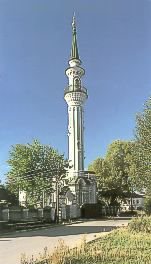Society > Religion
Religion
Tatarstan is a multinational republic in terms of the population composition, the very circumstance accounting for the diversity of denominations and religious groups in its territory. Another important feature of the republic that is both nationalities are effectively equal in quantity which is historically associated with the two major religions - Islam and Orthodoxy.
The religious situation in Tatarstan is on the whole stable and reflects the changes in state-church relations that took place over the last decades and activities of various religious associations all over the Russian Federation.
 | |
| Azimovsky Mosque |
The state policy of the republic is aimed at supporting the balance of interests of Islam and Orthodox Christianity and the equality of all religions under the law. The formation of a culture of tolerance on the basis of respect for human rights and respect for religious diversity have been taking place over the last decade in a form of a dialogue at the state, social, confessional and interconfessional levels.
As of January 1, 2010, as many as 1440 religious organizations were registered in Tatarstan, comprising the following: 1087 - Muslim, 262 - Orthodox Christian under the Moscow Patriarchate, 3 – Judaic, 1 – Russia's Orthodox Autonomous Church , 4 – Real-Orthodox Church, Old Believers’ Church – 2, Roman Catholic Church – 2, Evangelic Christians – 29, Evangelic Christians Baptists – 5, Christians of Evangelical Faith – Pentecostals – 16, Adventists of the 7th day – 11, Lutherans – 5, New Apostle Church – 1, Jehovah’s Witnesses – 5, Church of the Last Testament (Vissarionov’s) – 1, Krishnaists – 2, Bahai – 1, Buddhism – 1, Mormon Church – 1, Ahmadiyah – 1.
In terms of the number of operating religious organizations Tatarstan is leading among the other Russian regions. Of late, the number of religious organizations has stabilized, with the number of communes having slightly scaled up, generally presented by Islam and Orthodoxy associations.
 | |
| Annunciation Cathedral |
Islam-Orthodox dialogue and mutual support are the forms of religious interaction that determine the spiritual climate of our region contributing to the moral improvement of society as well as getting rid of the social diseases of our time. The commonwealth of the leading religions of the Republic of Tatarstan preclude xenophobia, religious extremism and radicalism from originating and spreading which are detrimental to the socio-political foundations of many countries.
During the last years the religious organizations worked out some important documents which reflected the most urgent questions of their mutual relations with the state and society. ("Bases of social concept of the Russian Orthodox Church" and " Bases of social program of the Russian Muslims", accepted by the RF Council of Muftis). The need for development of public relations caused the scientific approach to create new projects of state-confessional relations.
The Law of the Republic of Tatarstan "On Freedom of Conscience and Religious Associations" came into effect on August 28, 1999. It provides for specific features of the multinational republic, sets forth the legal principles of church-state separation, specifies the position of the state as regards religious relations, and proclaims freedom of conscience and religious associations. The Law is intended to achieve mutual understanding, tolerance and true freedom of conscience and freedom of worship.
Since the law was enacted in the republic, considerable progress has been made in the spiritual and moral climate, organizational unity in the religious organizations strengthened.